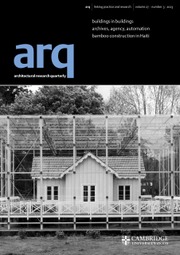Article contents
Living in the field: ethnographic experience of place
Published online by Cambridge University Press: 09 March 2012
Extract
In our daily life we draw heavily on our experiential interpretations of the places we inhabit through our work and domestic lives. Such understandings draw directly from the senses and our bodily engagement in space. In contrast, our analyses and interpretations of the places and sites of others often rely on a different range of skills in which ‘objectivity’ is privileged over personal responses. Such approaches usually rely on short visits in which hard ‘factual’ and visual data is collected quickly. Rarely in architectural or urban studies do researchers live ‘in the field’. This contrasts markedly with anthropology where time spent living in the field is regarded as essential, and such ethnographic studies gain credence and credibility through long periods of residence.
- Type
- theory
- Information
- Copyright
- Copyright © Cambridge University Press 2011
- 2
- Cited by


